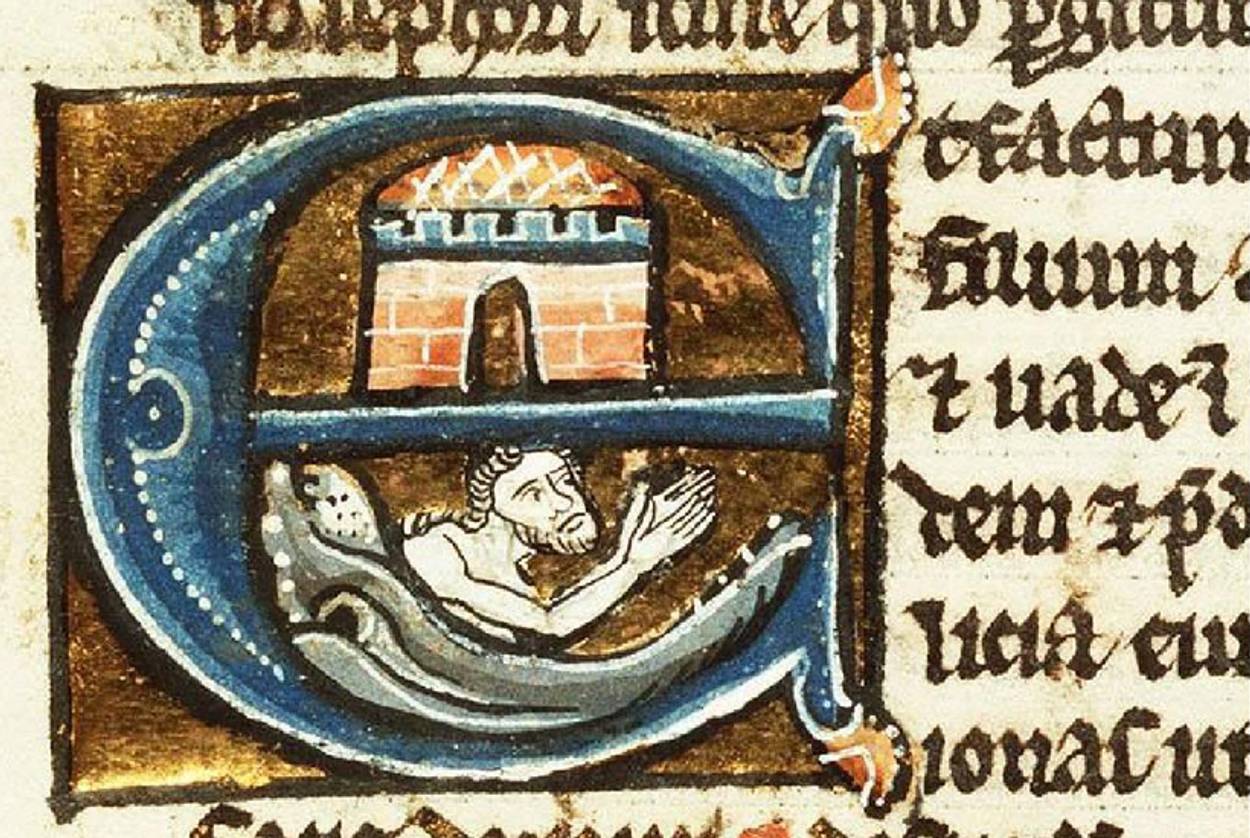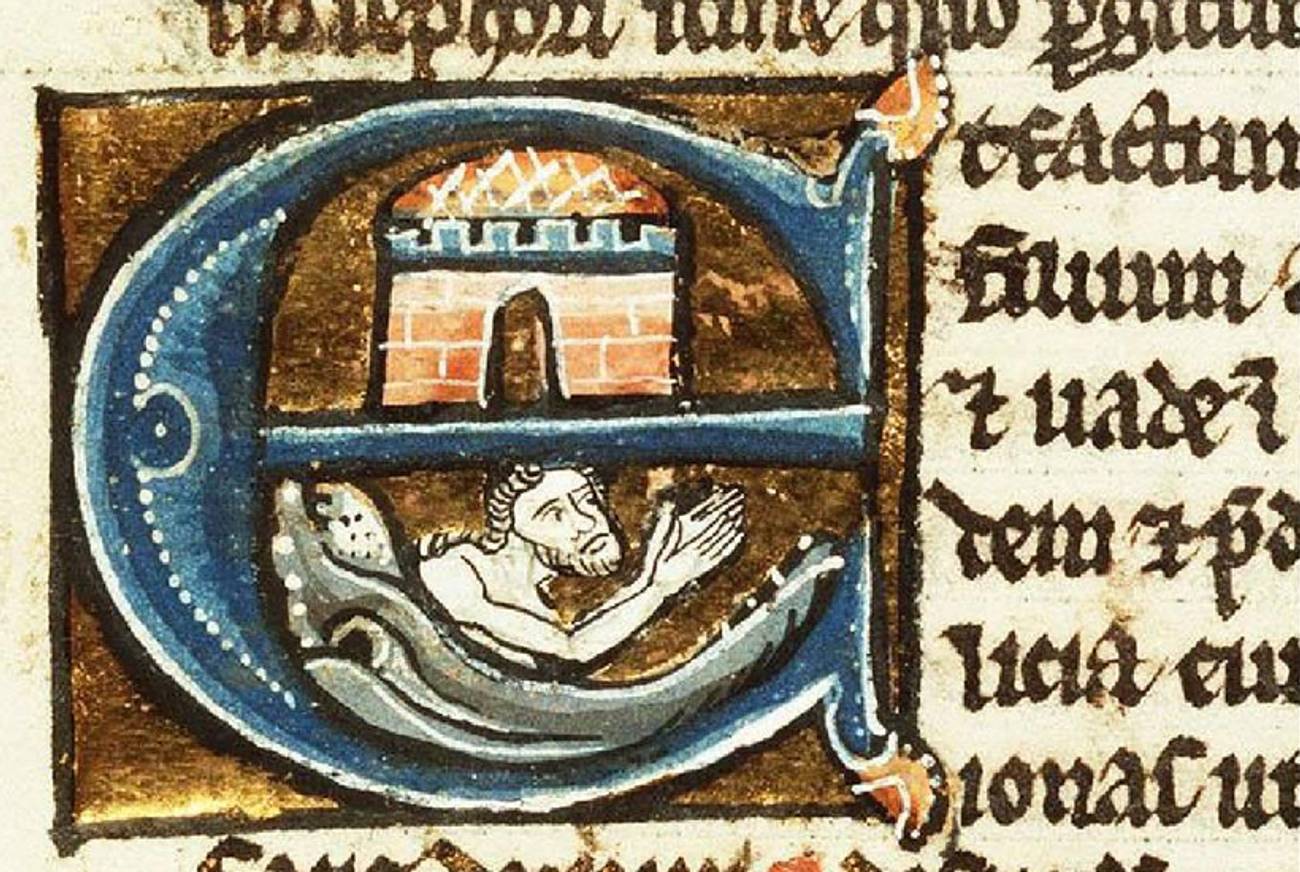A Young Lawyer, Given a Revelation by God, at Sea About What To Do With It
In Joshua Max Feldman’s entertaining debut novel ‘The Book of Jonah,’ Greed is Good meets Sept. 11




The Book of Jonah is one of the shortest books of the Bible—its four chapters could fit on two printed pages—and one of the oddest. If it didn’t sound blasphemous, you could even call it a satire, a joke about the whole idea of prophets and prophecy. When the story starts, God summons Jonah, about whom we know nothing but his name, to go and “cry out against” the wicked city of Nineveh. Unlike your ordinary dutiful prophet, however, Jonah refuses to serve God and tries to escape his destiny by sailing away—a move that suggests a flawed understanding of God’s omnipresence.
God stops Jonah’s escape by sending a great storm, which threatens to sink the ship, until the sailors realize who is the cause of the trouble and throw Jonah overboard. Then he lands in the belly of a great fish—a scene out of a cartoon, except that Jonah’s beautiful prayer for forgiveness turns the absurd into the sublime:
The waters compassed me about, even to the soul; the depths closed me round about, the weeds were wrapped around my head.
I went down to the bottoms of the mountains; the earth with her bars was about me forever; but thou hast brought up my soul from corruption, O Lord my God.
When God heeds the prayer and rescues Jonah, he finally agrees to prophesy in Nineveh, warning the city that it will be destroyed. It turns out, however, that Jonah is actually too good of a prophet: He convinces the king and the people to repent so sincerely that God calls off the planned apocalypse. This sends Jonah into a fit of pique: He knew from the beginning, he tells God, that God wouldn’t follow through on his threats, which is why he didn’t want to be a prophet in the first place.
To teach him a lesson, God causes a tree to grow and then to die. If Jonah mourns for the tree, God explains, how much more so would the Creator mourn over the inhabitants of Nineveh? The book ends with one of the most famous anti-climaxes in literature: “And should I not spare Nineveh, that great city, wherein are more than six score thousand persons that cannot discern between their right hand and their left, and also much cattle?”
What lesson are we supposed to draw from this story? The official moral seems to be that a human being cannot escape God’s plan for him or her. But the story also implies that God is not to be trusted, that being a prophet is a raw deal—and that the people of Nineveh are barely smarter than their cows. (You could imagine the story starting out as an Israelite joke: “The people of Nineveh are so stupid that …”) The compression and fast pace of the tale add to the sense that the Book of Jonah is not to be taken entirely seriously.
Joshua Max Feldman, whose debut novel is titled The Book of Jonah, has caught these comic hints from the Bible and run with them. His novel, like its inspiration, is halfway between satire and religious epiphany—a delicate balance, which Feldman manages to maintain for most of the novel, if not quite all of it. What kind of person, Feldman asks, is the equivalent of Jonah today—a worldly man, an unwilling prophet, someone who likes his life so much that he would run away from God?
***
The answer is Jonah Daniel Jacobstein, a New York corporate lawyer in his early 30s, who spends his days helping big companies defraud little companies and his nights drinking and cheating on his girlfriend. Jonah, as his last name doubly underscores, is Jewish: “He liked the community of Judaism: the instant bond he felt toward any -berg, -man, or -stein he encountered, the connection he could claim to Albert Einstein, Sigmund Freud, Sandy Koufax, the Coen brothers, Bob Dylan, and everyone else in the familiar litany of distinguished Jews.”
In other words, Jonah is the kind of well-assimilated American Jew who is made very uncomfortable when, in the book’s first scene, he is accosted by a Hasid in a subway station. The Hasid lectures Jonah about his biblical namesake and promises that God will one day reward the good and punish the wicked—to which Jonah replies, “Well, it’s all very interesting,” before escaping this vision out of the Jewish past. He emerges to find a scruffy man smoking a joint and singing along to Tupac and realizes that this is the America where he feels at home: “The encounter was, Jonah felt, a better answer—a better retort—than any he might have given to the Hasid. … Staying open to the world and its inhabitants—living life—having fun—that was what mattered.”
It is a cleverly staged opening, designed to lull the reader—who of course has more in common with Jonah than with the Hasid—into a complacent satisfaction with what the Bible calls, pejoratively, “the world.” We all believe in tolerance, staying reasonable, shunning fanaticism, having a good time: It’s the American Dream, after all. Yet as Feldman goes on to show, Jonah’s good time is built on a foundation of moral corruption. This is most obvious at work, where Jonah is initially overjoyed to be assigned to a major case involving a pharmaceutical company. Doing well on this case, he knows, is the route to the partnership that he has already spent 17,500 hours working to achieve.
Yet Jonah quickly realizes that his client is actually in the wrong—that it stole the design of a drug from a smaller biotech firm and is dragging out the case in order to bleed the small firm dry with legal fees. It sounds morally wrong, yet as Jonah recognizes, it is just business as usual: “They were both involved in a system, a way of doing business; and every day there were winners and losers, new partners, new counterparties, mergers, lawsuits, settlements—and in the end, they all got rich anyway. It was the promise of white-collar America—and the only morality any of them were interested in applying was the system’s own internal logic.”
In his personal life, too, Jonah is a prisoner of business as usual. He has an “official” girlfriend, Sylvia, who he is about to move in with; but he has never quite broken things off with his unofficial girlfriend, Zoey. He recognizes that the persistent cheating is bad for him and everyone else, but—as with his drinking and smoking—knowing something is bad for you doesn’t mean you’re able to stop doing it. The reader is given the sense that Sylvia, a beautiful blonde who is a financial master-of-the-universe in training, represents the aspirational life Jonah thinks he should want; while Zoey, a neurotic Jewish blogger with body-image problems, represents the self he is actually comfortable with.
So far, The Book of Jonah sounds like a conventional novel about a young man on the make and his first-world problems. But Feldman is about to pull the rug out from under the reader, and Jonah himself. One night at a party, drunk and high, Jonah goes to the bathroom and looks in the mirror, and has a vision. A bright glowing light on the tip of his nose suddenly expands to become an “all-encompassing white to which all colors combine in negation—a blankness oceanic in depth.” Out of this blankness, Jonah views the city of New York in ruins, all its people dead or vanished:
the Empire State Building collapsed and Grand Central Station collapsed and the subway tunnels flooded with water and then water rising to the streets through the concrete so that what had been the city, this city, became an island again interlaced with rivers or buried in the rubble of things collapsed or burned or bombed or pulled apart …
It is the post-Sept. 11 vision we have all had, or have seen in the movies, all the more terrifying because we know that eventually, give or take an eon, it’s going to come true. Jonah’s epiphany ends with two Hebrew words in fiery letters, which he of course can’t read—but the reader who can read them will know that they say “Yonah Hineni,” “Jonah, here I am.” Here is the unequivocal message from God, the call that proves that the Hasid was right—that the old, abandoned Jewish religion was right. But Feldman has staged the episode in such a way that, even if Jonah accepts this revelation as divine, he doesn’t know what to do with it. He hasn’t been told anything so straightforward as “Go to Nineveh”—or New York—“and cry out against it.”
What does an ordinary man do when confronted with the divine? The answer, in the first and best half of The Book of Jonah, is that he runs. With skillful comic pacing, Feldman shows us Jonah getting himself into worse and worse trouble—with Zoey and Sylvia, with his law firm—because he’s desperately trying to avoid the message to change his life. Yet in a final irony, it is when Jonah submits to his vision—and the others that follow it—that he ends up doing the most real damage, to himself and those around him. Being a prophet, for Jonah as for his namesake, turns out to be an unrewarding job.
In a sense, that is where The Book of Jonah ought to end—with Jonah adrift, trying to be perfectly good in a society that functions best when everyone is a little bit bad. But Feldman has also given the novel another plot, focused on another major character, who alternates with Jonah at center stage and gradually takes over the second half of the book. This is Judith, who is essentially the modern-day Job to Jonah’s modern-day Jonah. Judith, too, is a young American Jew on the fast track to great things. But in her case, the track is derailed in college, when her parents are killed on Sept. 11. A period of hopeless wandering eventually leads her to an unlikely job working for a Las Vegas casino magnate, doing shady real-estate deals. In other words, she is an agent of today’s Nineveh, and inevitably her path collides with Jonah’s.
The Judith half of the novel, however, is not as plausible or coherent as the Jonah half. Judith’s life is mainly told, rather than shown, and the introduction of Sept. 11 into her biography seems artificial and unnecessary, when the attacks already loom so large in Jonah’s visions of a devastated city. As for Colonel Ferguson, Judith’s tough-talking, rapacious boss, he seems to come out of a different book entirely—in fact, he sounds like a hybrid of Gordon “Greed Is Good” Gecko and Christian Grey from Fifty Shades of Grey. The Book of Jonah loses some of its focus and control in its second half, and the resolution feels more tidy and sentimental than the novel that has gone before it. But Feldman’s ability to channel the absurdity and the challenge of the original Book of Jonah makes his novel an entertaining and thought-provoking debut.
***
Like this article? Sign up for our Daily Digest to get Tablet Magazine’s new content in your inbox each morning.
Adam Kirsch is a poet and literary critic, whose books include The People and the Books: 18 Classics of Jewish Literature.
Adam Kirsch is a poet and literary critic, whose books include The People and the Books: 18 Classics of Jewish Literature.